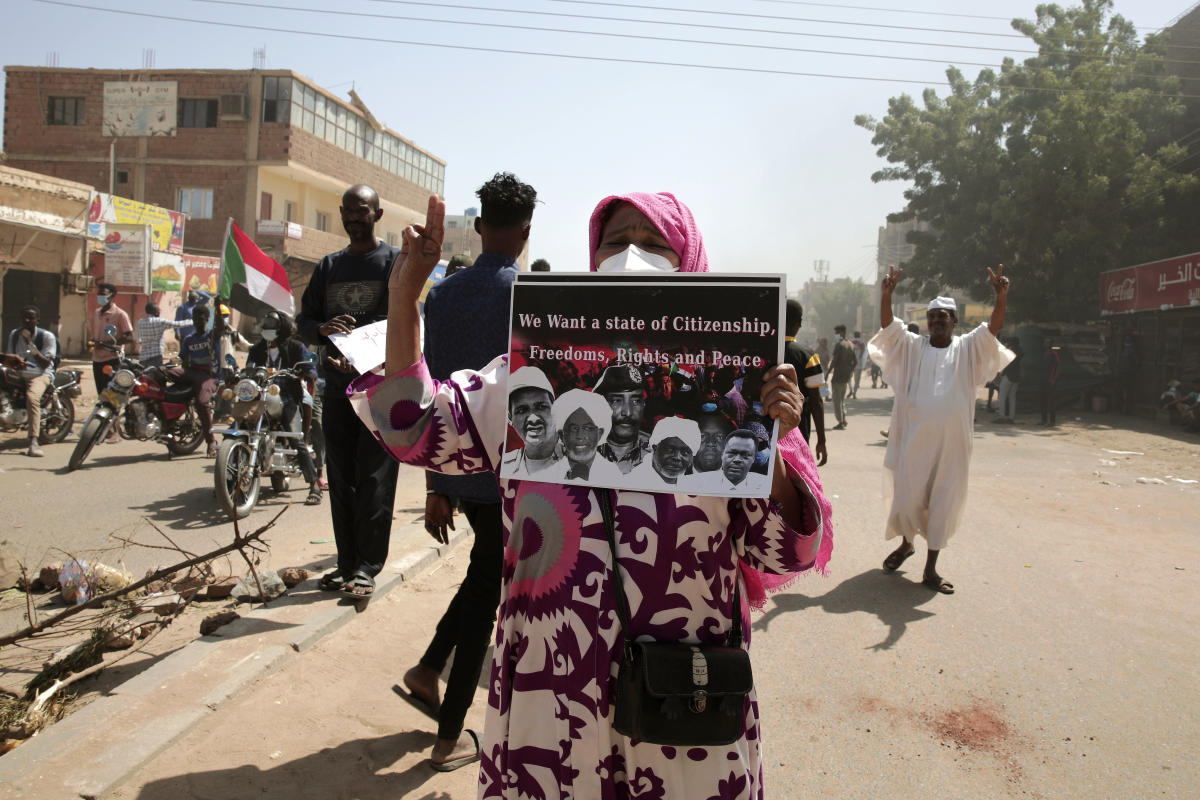
CAIRO (AP) — Thousands of demonstrators took to the streets of Sudan’s capital of Khartoum on Tuesday, marking the first anniversary of a military coup that upended the nation’s short-lived transition to democracy. One protester was killed after being run over by a security force vehicle, medical officials said.
The Sudan Doctors Committee said in a statement the protester was killed after being hit by a small security force truck while demonstrating in Omdurman, the twin city of the capital Khartoum. The victim’s identity has not been revealed.
The largest of the day’s demonstrations took place in Khartoum. Videos published on social media showed thousands of marchers with flags and drums, with later footage showing protesters standing in front of convoys of security forces. Smaller protests also occurred in several other cities across the country.
Netblocks, an online network tracker, announced early Tuesday that internet services across the country were blocked. Various Sudanese pro-democracy activists and local journalists reported security forces fired tear gas at protesters and earlier closed off bridges leading into Khartoum. The Associated Press has been unable to verify these claims.
In a statement published late Tuesday, the Sudanese police accused the demonstrators of attacking various military sites. The police said rebel groups and “sleeper cells” were operating among the demonstrators and targeting the security forces with explosive devices. Their statement provided no evidence. It did not mention the fatality.
Since its takeover, the military has cracked down and suppressed near-weekly pro-democracy marches, with as many as 118 protesters killed, according to statistics published by the Sudan Doctors Committee.
Sudan’s top general, Gen. Abdel-Fattah Burhan, and paramilitary deputy Gen. Mohammed Hamdan Dagalo were meant to oversee Sudan’s democratic transition after the country’s autocratic ruler Omar al-Bashir was toppled in a popular uprising in 2019.
But last year, Burhan dissolved the ruling Sovereign Council, arrested the transitional prime minister and unseated the civilian faction of a power-sharing government that had been in place. He later said he acted to stop a civil war.
Rights groups say hundreds have been detained since the military takeover, many without charge.
In recent weeks, internationally backed talks between Sudan’s pro-democracy movement and the ruling military have made some progress.
According to The Forces for the Declaration of Freedom and Change — an alliance of political parties and protest groups — the military has agreed on a draft constitutional document written by the country’s Bar Association. This would allow the appointment of a civilian prime minister who would lead the country through elections by 2024. Other issues, including the future role of the military, remain contested.
In a statement also marking the coup’s anniversary, the head of The U.S. Agency for International Development condemned the takeover but said she was ‘encouraged’ by the recent agreement over the Bar Association’s constitutional document.
‘‘I reiterate the call for the military to cede power back to civilian authorities,’’ Samantha Powell added.
But Sudan’s more ardent pro-democracy groups, including the grassroots Resistance Committees who spearhead anti-coup street protests, have rejected any settlement with the military. The committees, 50 of which published their own draft constitutional document earlier this month, have continually demanded that those responsible for the year’s deadly crackdown on demonstrations be tried in court.
‘‘I have no trust in the army’s intentions, the new negotiation is just a new division of wealth and power” said Ammar Yahya, the spokesperson for a Khartoum branch of the Resistance Committees.
According to Hamid Khalafallah, an analyst and researcher specializing in Sudanese governance, the Bar Association’s failure to incorporate the demands of the Resistance Committees could potentially deepen divisions within pro-democracy groups and stunt any future transition.
‘‘The Bar Association’s document does not consider the significance of the Resistance Committees as political actors, nor the political charters they produced,” Khalafallah said.
The coup has plunged Sudan’s already inflation-riddled economy into deeper peril. International aid has dried up while bread and fuel shortages, caused in part by the war in Ukraine, have become increasingly routine.
The year has also seen a resurgence of deadly tribal clashes in the country’s neglected peripheries. Fierce clashes between the Hausa and Berta people last week killed at least 230 people in southern Blue Nile province.
Many analysts consider the rising violence in the south a product of the power vacuum caused by the military takeover, with the ruling generals’ clampdown focused on the center of power, Khartoum and the country’s heartland, while the peripheries descend into chaos.
Burhan and Dagalo have separately promised to step back from politics following the reinstatement of a civilian government. But amid the chaos, both have also sought to further their political influence.
Dagalo’s paramilitary Rapid Support Forces, implicated in the killing of more than 100 sit-in protesters in June 2019 in Khartoum, have continued to expand across the country. Meanwhile, Burhan has overseen the reinstatement of dozens of civil servants sacked by the previous government for their association with al-Bashir’s circle.




